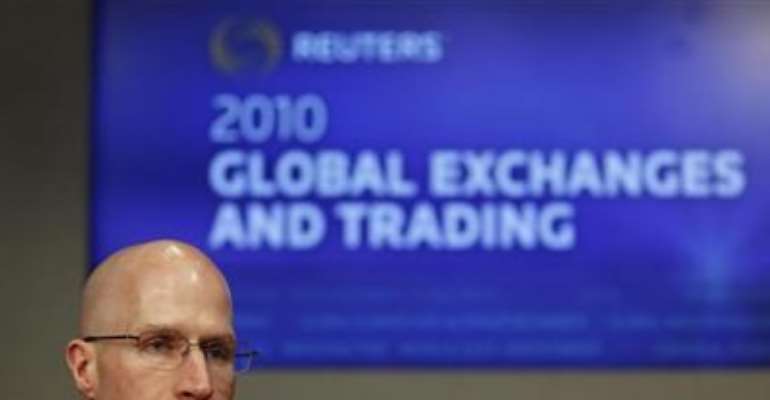BATS Exchange Withdraws IPO After Stumbles

In a breakdown that resembled a mini version of the 2010 "flash crash," a series of blunders hit the market debut of BATS Global Markets Exchange Inc on Friday, causing the company to take the extremely rare step of withdrawing its initial public offering of shares.
The problems Friday morning caused BATS shares briefly to trade for less than a penny, confusing investors and potentially threatening the future of the fledgling exchange itself.
The glitches also fouled a trade in shares of Apple Inc, the world's most valuable company, and caused a temporary halt in the stock.
Prices plunged shortly after BATS shares began their first day of trading on the BATS exchange, a start-up that in a few years has captured about 11 percent of U.S. equity market volume and 3 percent of equity options volume.
"The one thing they would have guarded against is the integrity of their platform on the day they went public," said Francis Gaskins, president of IPO research site IPOdesktop.com, in Los Angeles.
The exchange operator had priced 6.3 million shares at $16 per share late Thursday in an initial public offering sold by lead underwriters Citigroup Inc, Morgan Stanley and Credit Suisse Group. Several former or current Credit Suisse bankers serve on BATS' board, according to a BATS regulatory filing.
As trading began on Friday, BATS stock dipped to $15.25. Then extreme turbulence hit. A slew of bad trades at less than a penny sent the stock plunging. Though the trades were later voided, the plunge unnerved investors.
Around the same time, a bad trade for 100 shares of Apple also went through, triggering a circuit breaker that temporarily halted trading of Apple.
At 11:07 a.m. EDT the BATS exchange said it was investigating system issues with trading in symbols in the range "A" through "BF," which include Apple and BATS.
The problems caught the company flatfooted and unable to provide a detailed statement. A series of updates on its website noted but did not explain "system issues." At 3:10 p.m. EDT, the company said shares will not resume trading on Friday and that 'all executions in the opening auction will be canceled.'
BATS officials declined repeated requests for comment.
The IPO was an embarrassment for the lead underwriters, and late in the day BATS announced that the IPO would be withdrawn. Spokespersons for the banks either declined to comment or were not available for comment.
Market participants lost little time criticizing the exchange, and the debacle lit up the Twittersphere.
"It's just another black eye for the fragmented equity structure," said Joe Saluzzi, co-head of equity trading at Themis Trading in Chatham, New Jersey, and a frequent critic of U.S. equities market structure. "Every day we see things like flash crashes and now IPOs that can't get off the ground." On StockTwits.com, a stock-related Twitter site, commentators took aim at the company. "Man are those investors who participated in the IPO breathing a sigh of relief right now," wrote one.
The BATS exchange was forced to declare "self-help," which means an exchange is dealing with internal problems processing trades and needs to send trades through other venues, such as Nasdaq. The erroneous trades were later canceled by Nasdaq. BATS said on its website that trading on its exchange would resume at 1:20 p.m. (1720 GMT), but later said there was another delay. It set no time for a resumption, and eventually said trade would not resume.
The glitch on the first day did little to encourage investors. "The last thing you want to do as a listing exchange is mess up your introduction to the public investment world - the IPO," said Jason Weisberg, managing director at Seaport Securities Corp. The failed debut comes as regulators, led by the Securities and Exchange Commission, have been cracking down on exchanges and looking at the relationship between high-frequency trading systems and the exchanges.
The trading snags also came on the same day The Wall Street Journal printed a front-page story saying BATS was the subject of an SEC probe of high-frequency trading.
More investigations against exchanges are pending, according to a person familiar with the matter. BATS, headed by 45-year-old Joe Ratterman, was formed in 2005 by major banks and trading firms looking to break the stranglehold that the NYSE and Nasdaq had on U.S. stock trading, forcing the traditional venues to modernize their technology.
Last November, BATS acquired pan-Europe equity exchange Chi-X Europe for $300 million to challenge that region's dominant exchanges with faster and cheaper trading services.
According to BATS' offering documents, the BATS exchange has an 11.3 percent share of the U.S. equity market and a 3.1 percent share of the U.S. equity options market. BATS was scheduled to be the first IPO to list on the exchange.
Its difficult debut on Friday led some traders to question whether the exchange is reliable to compete with its bigger rivals.
"I think some companies might say ‘If they can't handle the IPO of their own stock, how can they handle the IPO of our stock?'" said Dennis Dick, a Detroit-based market structure consultant and trading member at Bright Trading LLC. "There is going to be a confidence issue of listing on BATS."
REUTERS
